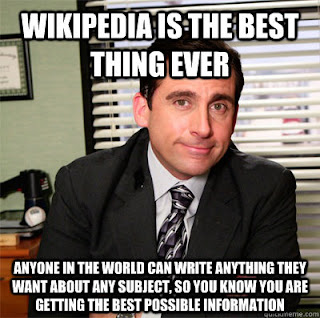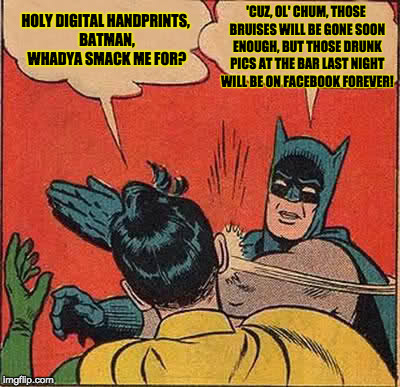In today's classroom, literacy has a much broader scope than just being able to read - it also means being able to navigate around the multimedia environment that everyone is exposed to and bombarded with. According to her
article from the
American Library Association website, Renee Hobbs states that "the
new definition of
literacy is the ability to adapt to changing technology
and the ability to research and create with digital tools." Reading and comprehension are not only limited to the printed page anymore. Now, being able to read and comprehend has to be related to blogs, social media, wikis, and non-traditional sources like online magazines IN ADDITION TO the printed page.
But it's not only reading and comprehending the material, it is also discerning what information is VALID! It can be more safely assumed that traditional print media are more valid than digital media in many respects: newspapers and magazines traditionally go through an editing process that also requires verification of sources by the authors, and books in libraries are broken down into categories such as fiction and non-fiction/reference because of generally accepted standards. This system of validation is not necessarily present in digital media. The beauty of the internet is that anyone can contribute anything to it, but the problem with the internet is also that ANYONE can "contribute" ANYTHING to it. See my
previous post about how Howard Rheingold challenges us to be "crap detectors" when discerning validity of sources online. Just because an article is on a website doesn't mean that the author has to follow the same standards of verification that traditional print media authors do, although there are many traditional media outlets that have digital formats as well, so that does add to SOME verification...
The challenge for today's learners, and teachers as well, is being able to discern what is valid and what isn't in the digital realm. Reading and comprehending are much much more that just being able to read and understand what one is reading - it is also being able to determine that what one is reading is also a valid resource of viable information. Because that is a challenge it can provide stimulating discussion and reflection, but it is also very easy to assume for a teacher and a student that just because something is on the internet it MUST be true... All too often I have had students say, "But on this web site, blah blah blah, etc., so therefore blah blah..." and so forth, but I then have to ask what the source was and can they verify that information somewhere else that might be a little more concrete than someone's Tweet or Facebook post. I mean, look at how many of President Trump's tweets have been disproven by actual research and reporting by the media, although he would claim that is fake news...
Technology is ever changing, and as a result we teachers have to be adaptable to that change. Students today are growing up with the technology many of us are still learning or have yet to master. That's a tough challenge for us, but one we must embrace. It's so much easier for a student today to find a movie version online of something you want them to read instead, or to find and copy someone else's assignment posted on a web site somewhere that they can plagiarize and use to turn in as their own work. These are just a couple of the challenges we teachers have to face, because students are smart and will figure out the ways to make their own lives easier. According to their
article at
EDUCAUSEReview, Phil Ventimiglia and George Pullman "teachers can become set in their ways" because "they know what has worked
for them in the past, so they think 'why shouldn't students learn the same way
now?' The challenge for teachers is to be welcoming to being adaptable, just as students will have to continue to adapt to changes that they will have continue to deal with their entire lives
after school is over." Because today's students have had more exposure early to different and changing digital media formats, being able to use these tools appears to be much easier for them. Many of us had only books, magazines, encyclopedias, and going to Blockbuster to rent a movie (remember that?! The Family Video franchise near my house just closed a couple weeks ago...). Not only do we teachers need to be vigilant in our own digital literacy, but we need to be adaptable to the changes that may possibly be easier for students, because for those teachers who don't, students will always seem to be 2 and 3 steps ahead.





Comments
Post a Comment